Reflections on trafficking: the sexual exploitation of Nigerian women in Palermo
On the night of April 4th, as part of Operation No-Fly Zone, Palermo’s flying squad dealt a serious blow to Eiye, a Nigerian crime ring dealing in drugs and prostitution. At least 13 individuals were arrested. The following day, press attention focussed solely on the danger posed by these Nigerian gangs, emphasising their initiation rites and the violence perpetrated by members. As well as bringing the issue of Nigeria’s “confraternities” back to the forefront of political debate, this affair invites a wider reflection on the question of the victims of these criminal groups, in particular the women destined for sexual exploitation.
In this regard, it must be noted that it was in fact the testimony of a young Nigerian woman that prompted the investigations into the Eiye confraternity. Her statement against her traffickers revealed significant information about their links to the organisation. The woman in question, now free, had been forced into prostitution in one of the many “Connection Houses” hidden in the alleyways surrounding the historic Ballarò market, in the Albergheria neighbourhood of Palermo.
The issue of prostitution carried out behind closed doors cannot be overlooked. The statistics around indoor prostitution in Palermo itself are shocking. There has been a recent dizzying rise in this shadow economy. Until 6 months ago there were around 30 of these shuttered houses inside which girls are forced into prostitution, there are now more than 40 Connection Houses in the city. It should also be emphasised that some of the Nigerian girls forced to sell their bodies have come from other Italian cities. They had therefore left their migrant reception facilities, whether voluntarily or under duress, and moved recently to the Sicilian capital.
The new legislative decree 113/20181 on security and immigration (now law) has compounded the vulnerable condition of trafficking victims. The revoking of humanitarian protection, together with the changes made to the SPRAR* system, has done nothing but increase the marginalisation of the very weakest. The new immigration legislation has actually increased the number of migrants in the so-called “vulnerable” group, further exposing these people to the risk of resorting to illegal activity in order to survive.
As many had predicted, the number of undocumented migrants is growing. According to a study by the Italian Institute for International Political Studies (ISPI), between June 2018 and February 2019, the fall in humanitarian protection to 2%, alongside the low number of repatriations, caused an increase in the number of undocumented immigrants on Italian soil. The newly restrictive immigration policies quickly made themselves felt and, based on the data provided by ISPI, 40,000 more foreign citizens find themselves without a residence permit after the rejection of their asylum applications. The overturning of the SPRAR* system and the abolition of the residence permit for humanitarian protection therefore leave those foreign citizens most in need of help and protection, including victims of trafficking, undocumented and in a state of economic uncertainty. This increases the risk of their being pushed into – or back into – becoming victims of the criminal underworld.
This would also explain how little impact the edict of Oba Ewuare II had on tackling the sex trade. More than a year after the sovereign of Edo state in Nigeria freed all victims of trafficking, women continue to turn to prostitution to support themselves and their families. According to Osas Egbon, president of “Donne di Benin City”, a women’s organisation in Palermo, the majority of the Nigerian women in the city are technically free of the promises made in their home country, but continue to live in the Connection Houses.
In fact, the Oba’s words were not followed by what would have been effective actions to integrate sex workers into society and the workforce. For many of them, freedom remains a mirage. It cannot be fully enjoyed from the margins of society, with no options nor a title allowing them to remain legally in Italian territory.
The combination of restrictive immigration policies with a lack of viable alternatives to prostitution condemns Nigerian women to marginalization and invisibility. It reinforces and spreads the sad belief that for them there is no solution other than to continue selling their bodies.
Furthermore, in Palermo indoor prostitution is an obscure and mostly invisible phenomenon. Unlike the street, the closed context of an apartment prevents direct contact with women in the trade. In many cases Italian aid workers are unable to overcome these barriers to communication and building relationships. This hidden prostitution necessitates the adoption of innovative intervention strategies as well as new channels of communication.
In this context, there are certain prerequisites in order to establish solid local collaboration between institutions, charities and the Nigerian community. Involvement of this community in the process of identification and support of victims of trafficking would enable the creation of a “bridge” between victims and the services convened by the anti-trafficking expert task-force (Tavolo tecnico di contrasto alla tratta) established by the city council on 18th October 2018. This would allow the exploited women to communicate their own needs and requests for help, while at the same time enabling the regional network to better understand and target the phenomenon of indoor prostitution.
In the opinion of the author, claiming to help Nigerian victims of trafficking without involving that community itself significantly limits the possibility of planning effective combat strategies. The fear aroused by its many “grey areas” must not prevent the involvement of the law-abiding part of the Nigerian community. This involvement could be an enabling factor in creating an efficient anti-trafficking network in the territory, as well as in helping and quickly protecting those at risk of trafficking.
Within an anti-trafficking system characterized by clearly defined roles, having multiple different skill-sets is therefore a precious resource. From this perspective, the experience offered by members or representatives of the original community should be taken into due consideration. The holders of that knowledge are a valuable resource for the creation of effective anti-trafficking policies. They know the locations and ways in which sexual exploitation of Nigerian women happens, and moreover they know most people in their community. For these reasons, they can play a fundamental role in guiding aid workers through projects and initiatives to support the victims of trafficking exploited in Connection Houses and beyond.
Reliable spokespeople already exist within the Nigerian community. The organisation “Donne di Benin City”, an integral part of the expert task-force, has played a key role in supporting the victims of trafficking for more than 3 years. Meanwhile the spokesperson for the Sicilian chapter of the Nigerian Association (Associazione Nigeriana Regione Sicilia), Samson Olomu, has shown particular sensitivity to the issue of trafficking, openly denouncing the illegal activities of his fellow citizens.
In the opinion of the author, therefore, there is a clear need to resolve all doubts and eliminate uncertainties in order to begin a sincere dialogue between all parties and launch a path of mutual cooperation. Once and for all, we must ascertain the “uprightness” of our interlocutors and open ourselves up to encounters in order to build solid relationships of trust. In this sense, one wonders when it will be possible to create an effective network to combat trafficking if not in such a favorable situation.
By Guido Savasta
*SPRAR = Protection system for refugees and asylum seekers
Translated by Amica Sciortino Nowlan







